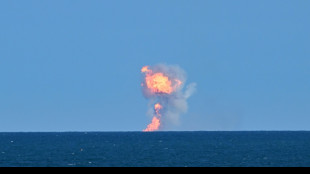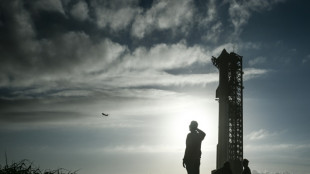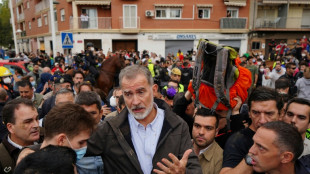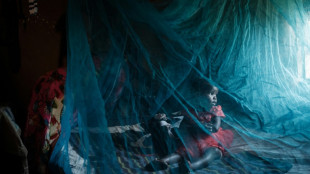
-
 Taliban govt clearing 'un-Islamic' books from Afghanistan shelves
Taliban govt clearing 'un-Islamic' books from Afghanistan shelves
-
Asian markets struggle as traders weigh geopolitical tensions

-
 Iraq holds its first census in nearly 40 years
Iraq holds its first census in nearly 40 years
-
SpaceX fails to repeat Starship booster catch, as Trump watches on

-
 European powers, US seek to censure Iran at UN nuclear watchdog board
European powers, US seek to censure Iran at UN nuclear watchdog board
-
SpaceX fails to repeat Starship booster catch, as Trump looks on

-
 European stocks fall on Ukraine-Russia fears, US focused on earnings
European stocks fall on Ukraine-Russia fears, US focused on earnings
-
Trump names China hawk Howard Lutnick commerce secretary

-
 SpaceX set for Starship's next flight -- with Trump watching
SpaceX set for Starship's next flight -- with Trump watching
-
Top-selling daily French daily Ouest-France stops posting on X

-
 Russian invasion toll on environment $71 billion, Ukraine says
Russian invasion toll on environment $71 billion, Ukraine says
-
New Botswana leader eyes cannabis, sunshine to lift economy

-
 China's Xi urges 'strategic' ties in talks with Germany's Scholz
China's Xi urges 'strategic' ties in talks with Germany's Scholz
-
COP29 negotiators strive for deal after G20 'marching orders'

-
 Walmart lifts full-year forecast after strong Q3
Walmart lifts full-year forecast after strong Q3
-
Son of Norwegian princess arrested on suspicion of rape

-
 US lawmaker accuses Azerbaijan in near 'assault' at COP29
US lawmaker accuses Azerbaijan in near 'assault' at COP29
-
Spain royals to visit flood epicentre after chaotic trip: media

-
 French farmers step up protests against EU-Mercosur deal
French farmers step up protests against EU-Mercosur deal
-
Burst dike leaves Filipino farmers under water

-
 Markets rally after US bounce as Nvidia comes into focus
Markets rally after US bounce as Nvidia comes into focus
-
Crisis-hit Thyssenkrupp books another hefty annual loss

-
 Farmers descend on London to overturn inheritance tax change
Farmers descend on London to overturn inheritance tax change
-
Floods strike thousands of houses in northern Philippines

-
 SpaceX set for Starship's next flight, Trump expected to attend
SpaceX set for Starship's next flight, Trump expected to attend
-
Several children injured in car crash at central China school

-
 Urban mosquito sparks malaria surge in East Africa
Urban mosquito sparks malaria surge in East Africa
-
Many children injured after car crashes at central China school: state media

-
 Asian markets rally after US bounce as Nvidia comes into focus
Asian markets rally after US bounce as Nvidia comes into focus
-
Tens of thousands march in New Zealand Maori rights protest

-
 Five takeaways from the G20 summit in Rio
Five takeaways from the G20 summit in Rio
-
Parts of Great Barrier Reef suffer highest coral mortality on record

-
 Defiant Lebanese harvest olives in the shadow of war
Defiant Lebanese harvest olives in the shadow of war
-
Divided G20 fails to agree on climate, Ukraine

-
 Can the Trump-Musk 'bromance' last?
Can the Trump-Musk 'bromance' last?
-
US to call for Google to sell Chrome browser: report

-
 Trump expected to attend next Starship rocket launch: reports
Trump expected to attend next Starship rocket launch: reports
-
Stocks, dollar hesitant as traders brace for Nvidia earnings

-
 Biden in 'historic' pledge for poor nations ahead of Trump return
Biden in 'historic' pledge for poor nations ahead of Trump return
-
Tropical storm Sara kills four in Honduras and Nicaragua

-
 Spanish resort to ban new holiday flats in 43 neighbourhoods
Spanish resort to ban new holiday flats in 43 neighbourhoods
-
Phone documentary details Afghan women's struggle under Taliban govt

-
 G20 wrestles with wars, 'turbulence' in run-up to Trump
G20 wrestles with wars, 'turbulence' in run-up to Trump
-
Stocks, dollar hesitant as traders eye US rate outlook, Nvidia

-
 G20 wrestles with wars, climate in run-up to Trump
G20 wrestles with wars, climate in run-up to Trump
-
G20 host Brazil launches alliance to end 'scourge' of hunger

-
 Stocks, dollar hesitant as traders scale back US rate cut bets
Stocks, dollar hesitant as traders scale back US rate cut bets
-
Trump confirms plan to use military for mass deportation

-
 UN climate chief at deadlocked COP29: 'Cut the theatrics'
UN climate chief at deadlocked COP29: 'Cut the theatrics'
-
Tractor-driving French farmers protest EU-Mercosur deal


Taliban govt clearing 'un-Islamic' books from Afghanistan shelves
Checking imported books, removing texts from libraries and distributing lists of banned titles -- Taliban authorities are working to remove "un-Islamic" and anti-government literature from circulation.
The efforts are led by a commission established under the Ministry of Information and Culture soon after the Taliban swept to power in 2021 and implemented their strict interpretation of Islamic law, or sharia.
In October, the ministry announced the commission had identified 400 books "that conflicted with Islamic and Afghan values, most of which have been collected from the markets".
The department in charge of publishing has distributed copies of the Koran and other Islamic texts to replace seized books, the ministry statement said.
The ministry has not provided figures for the number of removed books, but two sources, a publisher in Kabul and a government employee, said texts had been collected in the first year of Taliban rule and again in recent months.
"There is a lot of censorship. It is very difficult to work, and fear has spread everywhere," the Kabul publisher told AFP.
Books were also restricted under the previous foreign-backed government ousted by the Taliban, when there was "a lot of corruption, pressures and other issues", he said.
But "there was no fear, one could say whatever he or she wanted to say", he added.
"Whether or not we could make any change, we could raise our voices."
- 'Contradictory to religion' -
AFP received a list of five of the banned titles from an information ministry official.
It includes "Jesus the Son of Man" by renowned Lebanese-American author Khalil Gibran, for containing "blasphemous expressions", and the "counterculture" novel "Twilight of the Eastern Gods" by Albanian author Ismail Kadare.
"Afghanistan and the Region: A West Asian Perspective" by Mirwais Balkhi, an education minister under the former government, was also banned for "negative propaganda".
During the Taliban's previous rule from 1996 to 2001, there were comparatively few publishing houses and booksellers in Kabul, the country having already been wracked by decades of war.
Today, thousands of books are imported each week alone from neighbouring Iran -- which shares the Persian language with Afghanistan -- through the Islam Qala border crossing in western Herat province.
Taliban authorities rifled through boxes of a shipment at a customs warehouse in Herat city last week.
One man flipped through a thick English-language title, as another, wearing a camouflage uniform with a man's image on the shoulder patch, searched for pictures of people and animals in the books.
"We have not banned books from any specific country or person, but we study the books and we block those that are contradictory to religion, sharia or the government, or if they have photos of living things," said Mohammad Sediq Khademi, an official with the Herat department for the Propagation of Virtue and the Prevention of Vice (PVPV).
"Any books that are against religion, faith, sect, sharia... we will not allow them," the 38-year-old told AFP, adding the evaluations of imported books started some three months ago.
Images of living things -- barred under some interpretations of Islam -- are restricted according to a recent "vice and virtue" law that codifies rules imposed since the Taliban returned to power, but the regulations have been unevenly enforced.
Importers have been advised of which books to avoid, and when books are deemed unsuitable, they are given the option of returning them and getting their money back, Khademi said.
"But if they can't, we don't have any other option but to seize them," he added.
"Once, we had 28 cartons of books that were rejected."
- Clearing stock -
Authorities have not gone from shop to shop checking for banned books, an official with the provincial information department and a Herat bookseller said, asking not to be named.
However, some books have been removed from Herat libraries and Kabul bookstores, a bookseller told AFP, also asking for anonymity, including "The History of Jihadi Groups in Afghanistan" by Afghan author Yaqub Mashauf.
Books bearing images of living things can still be found in Herat shops.
In Kabul and Takhar -- a northern province where booksellers said they had received the list of 400 banned books -- disallowed titles remained on some shelves.
Many non-Afghan works were banned, one seller said, "so they look at the author, whose name is there, and they are mostly banned" if they're foreign.
His bookshop still carried translations of Russian author Fyodor Dostoyevsky's "The Gambler" and fantasy novel "Daughter of the Moon Goddess" by Sue Lynn Tan.
But he was keen to sell them "very cheap" now, to clear them from his stock.
strs-qb-sw/cwl
Y.Ibrahim--CPN
